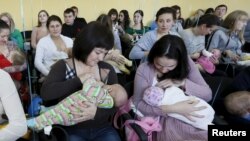The United States is disputing a newspaper report that it bullied and threatened nations in an effort to water down a World Health Assembly resolution supporting breastfeeding.
A State Department official said, "Reports suggesting the United States threatened a partner nation related to a World Health Assembly resolution are false."
Health and Human Services spokeswoman Caitlin Oakley also described as "patently false" attempts to portray the U.S. position as anti-breastfeeding.
A New York Times report Monday said the U.S. delegation at the assembly in Geneva this spring embraced "the interest of infant formula manufacturers" and "upended the deliberations."
The resolution had been expected to be approved "quickly and easily," the newspaper said. Instead, the U.S. delegation "sought to wear down the other participants through procedural maneuvers in a series of meetings that stretched on for two days, an unexpectedly long period."
A State Department official said the U.S. believed "the resolution as originally drafted called on states to erect hurdles for mothers seeking to provide nutrition to their children."
The official said the United States "recognizes that breastfeeding and provision of breast milk is best for all babies," but also recognizes that "not all women are able to breastfeed for a variety of reasons."
The official said, "Women should have access to full and accurate information about breastfeeding," as well as "full information about safe alternatives when breastfeeding is not possible."
Oakley said, "The issues being debated were not about whether one supports breastfeeding."
"Many women are not able to breastfeed for a variety of reasons, these women should not be stigmatized; they should be equally supported with information and access to alternatives for the health of themselves and their babies," she said.
The Times said Ecuador was slated to introduce the World Health Assembly breastfeeding resolution, but after the U.S. threatened to "unleash punishing trade measures and withdraw crucial military aid," it "quickly acquiesced."
The newspaper said more than a dozen participants from different countries at the assembly confirmed the "showdown over the issue." Many of them, however, asked to remain anonymous because they fear U.S. retaliation.
Health advocates had trouble finding another sponsor who did not fear U.S. "retaliation."
The Times said that in the end, the Russian delegation stepped in as the resolution's sponsor. It said, "The Americans did not threaten them."
Patti Rundall, policy director of the British advocacy group Baby Milk Action, told the newspaper, "What happened was tantamount to blackmail, with the U.S. holding the world hostage and trying to overturn nearly 40 years of consensus on the best way to protect infant and young child health."
The State Department official said the United States works "to identify common cause when possible and does not shy away from expressing its disagreement when necessary."
Cindy Saine and Barry Newhouse contributed to this report.
